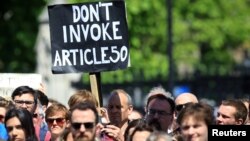Several experienced British litigators along with the country’s leading public-interest law firm are drafting a legal challenge to the Brexit referendum to force -- at the very least -- a parliamentary debate before the government triggers the automatic procedure for exiting the European Union.
The legal action may add to the political and financial tempest provoked by the June 23 referendum, turning the turmoil into a perfect storm.
The group consisting of eight lawyers drawn from several different legal firms, including Bindmans, which specializes in human rights law, wants to test Brexit in the courts. The lawyers expect their action will get passed up quickly to the country’s Supreme Court, with a ruling likely by September, if their action proceeds.
Prime Minister's legal power is key
At the heart of the legal challenge to the government invoking Article 50, which automatically triggers a two-year exit mechanism, will be the question whether the prime minister has the legal power to implement Brexit without a full parliamentary debate and vote by Britain’s lawmakers.
The overwhelming majority of lawmakers -- 454 MPs to 147 -- are opposed to Brexit – as are a majority of Peers in the House of Lords. The Peers can delay legislation. The Conservative government only has a narrow overall eight-seat majority in the House of Commons and most Tory lawmakers are also pro-Remain.
In an interview with VOA, Jolyon Maugham, a partner at Devereux, one of Britain’s top civil and commercial legal firms, said he and his colleagues are not trying to refight the referendum but want to challenge the government’s position that Brexit can be implemented as an ‘act of the prime minister.’
“There is a constitutional question whether the result of the referendum having been advisory should advise Parliament, which is democratically enfranchised, or a prime minister, who never is democratically enfranchised as he or she are not directly elected,” says Maugham.
He adds: “We are likely to begin by writing to the government asking for an assurance that Article 50 won’t be invoked without the consent of Parliament. If that’s not forthcoming, and I don’t think it will be, our next step would likely be to secure a declaration from the courts that implementation has to receive Parliamentary consent.”
Online funding
Maugham says the seed funding for the action has come from an online crowd-funding appeal. Contributions were capped at $140 and the group raised $15,000 in a few hours. “We didn’t want to appear to be funded by some rich people. And we certainly didn’t want this to appear as a bunch of overpaid lawyers drinking at the trough,” he says. The group will return for more funding as their legal action unfolds.
“The referendum was set up as an advisory referendum it was never set up as a mandatory one and that raises the question, “Who does it advise? The prime minister, who is not elected, or Parliament?’ We think Parliament.”
If they are successful, new legislation would have to be introduced, Maugham says. He adds: “MPs would have to take into account the referendum result but they would have to take into account a range of other factors. They would have to ask questions like, ‘was the referendum a clear mandate to leave? What was the quality of the evidence that was given to members of the public? Were they misled about what Brexit might mean for them? What is an MP’s job? Is it to deliver direct democracy or is it to exercise independent judgment about what is best for the country?’”
All of this will form part of the case Maugham and his colleagues likely will present to the judges.
They are not the only top lawyers exploring a range of legal options, including whether the government was right to deny a vote to British expats who have been overseas for more than 15 years.
Other legal challenges
On Monday a major London firm, Mishcon de Reya, said it was preparing also to challenge when and how the British government invokes Article 50.
The firm has declined to reveal the identity of its clients. But it has retained two of the country’s leading advocates – one of them, Lord Pannick, has argued dozens of cases before the UK’s Law Lords and the European Court of Justice.
In a statement, a Mischon de Reya partner, Kasra Nouroozi, said: “The outcome of the referendum is not legally binding and for the current or future prime minister to invoke Article 50 without the approval of parliament is unlawful.”
Anti-EU lawmakers are outraged at the legal threats. Pro-Leave Tory MP Bernard Jenkin said: “This is an extraordinary attempt to disrupt the consequences of a referendum.” He added: “We don’t need the judges to intervene.”
Needed or not, some lawyers are exploring the legal opinion of Philip Allott, Professor Emeritus of International Public Law at Cambridge University.
He argues the government’s motivation for calling the referendum could be challenged. Speaking to VOA, Prof. Allott says it could be argued the referendum was not in the national interest but prompted by a rebellion within Conservative ranks.
He said also the government “failed in its duty to take into account the possible damaging impact on groups of people” nor did it seek ahead of time to minimize injury.







